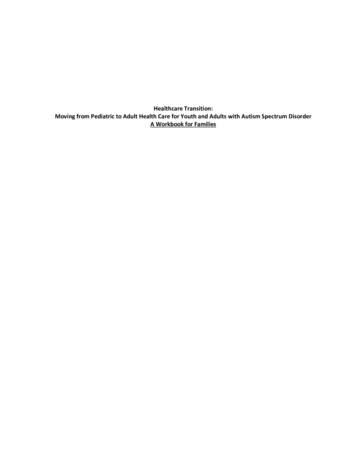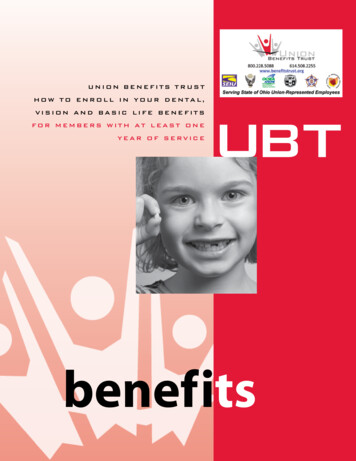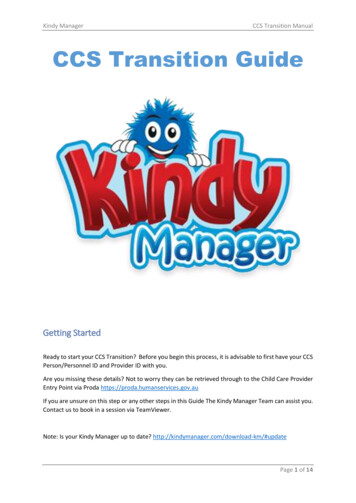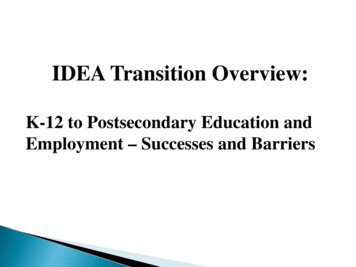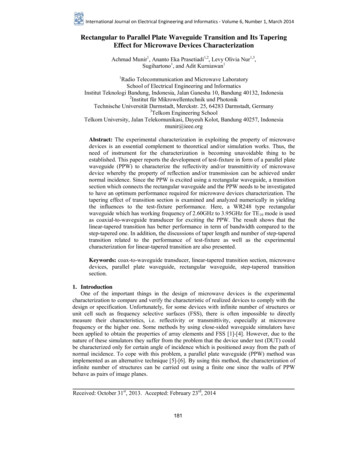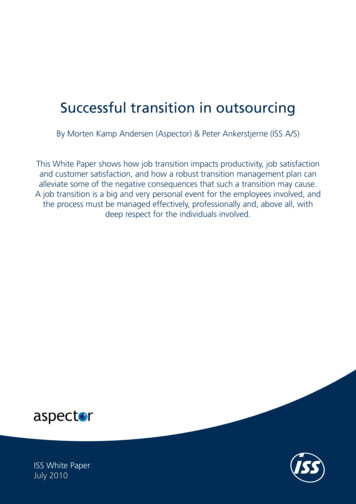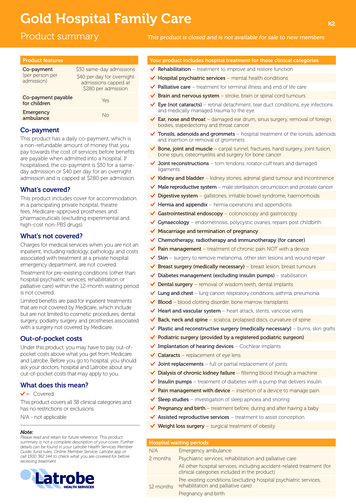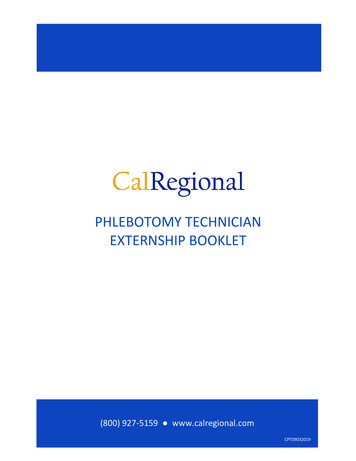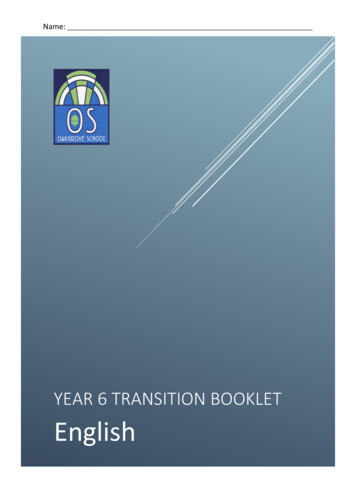
Transcription
Name:YEAR 6 TRANSITION BOOKLETEnglish
Dear Year 6,Welcome to Oakgrove School English Department!In preparation for joining us in September, as Year 7 students, we have put together thisbooklet as a taster of some of the topics you can expect to be studying with us at secondaryschool.Literature – the study of novels, plays and poetry – is a very important part of thecurriculum from Year 7 to Year 11 so we have focused on two key writers for your transitionbooklet, in order to introduce you to some examples of and extracts from their work. As youprogress through the booklet, you will develop your knowledge and understanding of thecontext (or background) in which their work was written, their choices of language, types ofcharacter and their ideas.The other key element we would like you to concentrate on in this booklet is your ownpersonal reading. Reading regularly is incredibly important to your progress, both as astudent and as an individual, and it becomes even more important, the older you get.Reading provides you with the skills to: Understand information and instructionsCommunicate effectively to othersDevelop your imaginationBe entertainedExperience different places, cultures and peopleImprove your own writingAs a result, we want you to keep up your reading throughout your time at Oakgrove School.We have included a reading profile and an independent reading journal in the booklet soyou can write about your reading habits and your favourite book from your summer ofreading. There’s a suggested reading list, too, in case you need some inspiration and we’lllook forward to hearing all about your recommendations, when we return to school inSeptember!We hope you enjoy working through the activities in this booklet.Remember to bring your completed work with you in September so you can impress yournew English teacher!Best wishes,The English Department
CHARLES DICKENSTask 1 – Dicken’s BiographyResearch Dicken’s life and match each question with the correct answer.You will see that Dickens showed great resilience in his childhood and that some veryimportant people admired the way he communicated his creative ideas in his writing.1. Where was Charles Dickens born?2. Which member of Dickens’ family was put in prison forfailing to pay his debts?3. Where did Dickens work when he was a child?4. What was the name of Dickens’ first successful novel?5. When was Dickens born?6. How many children did Dickens have?7. Who did Dickens write and perform plays for?8. Where is Dickens buried?9. Who did Dickens write about in many of his novels?a. In a factoryb. 10c. Queen Victoriad. Westminster Abbeye. Portsmouthf. Pickwick Papersg. The poorh. His Fatheri. 1812Task 2 - Contextual TaskAn Interview with Mr Dickens for The Victorian Reader MagazineMr Dickens, you spent a lot of your time living in London but you also have a closeconnection with Rochester in Kent and the local areas surrounding it. Can you tell usmore about how you came to know this place?My family and I moved to Chatham when I was 5 years old and I have lots of fond memoriesof the area, particularly the town of Rochester. My father was a clerk in the Naval Pay Office so wemoved quite frequently back in those days.
Tell me about some of your childhood memories of Rochester and the local area.I used to love going on long strolls with my Father and exploring the beautiful Kentcountryside. One of my favourite places to take a stroll with my Father was the grounds ofCobham Hall, just outside Rochester. There was a huge house on top of a hill and Iremember my Father saying to me that if I worked hard enough, I might live in that house oneday. Well, I did work hard and bought Gad’s Hill Place in 1856. Although I owned more than onehouse, this was where I spent most of my time for the last 14 years of my life.Good for you! How much did Rochester influence your work?I used Rochester as inspiration for some of the now famous settings in my novels. Forexample, Satis House in Great Expectations is based on a place called Restoration House,which is in the centre of Rochester. It is called Restoration House because King Charles II stayedthere the night before the Restoration (this was when he returned to the throne after OliverCromwell had been in charge).Mr. Dickens, lots of readers would love to find out more about the history of the town yougrew up in and returned to in later life. Can you tell us some interesting facts aboutRochester?You may be surprised to know that Rochester became a city in 1227 during the reign ofHenry III. (It lost its city status in 1998 and is now a town). Rochester Cathedral was builtin 604 and is the second oldest cathedral in the country. As well as hosting religiousservices, it is also now used for school presentation events and graduations for students at KentUniversity. It wasn’t until 1088 that Rochester Castle was built. It still stands today and visitors caneven climb right to the top and admire the beautiful views. There are also the castle gardens, whereconcerts and fairgrounds are frequently held.It sounds like there’s lots to do and see in Rochester; perhaps we should visit one day!Thank you for your time, Mr. Dickens.Questions:1. How old was Dickens when he moved to Chatham?2. Where did Dickens enjoy taking strolls with his Father?3. Give one example of how Rochester influenced Dickens’ work.4. Where does Restoration House get its name from?5. Who was on the throne when Rochester became a city?6. Give one example of something Rochester Cathedral is used for.7. When was Rochester Castle built?8. Name one activity that visitors can enjoy on a visit to Rochester Castle.
Task 3 - Contextual Task:Ode to RochesterWhat festivals does the town of Rochester keep?Quite a few but I’ll start with the one they call Sweeps.The Sweeps Festival celebrates the start of summerAs this was when young chimney sweeps could exchange hard work for slumber.Visitors from all over the land visit Rochester each yearTo take part in the dancing, joy and cheer.There are always hundreds of Morris dancers lining the streets,You can hear them coming with their ringing bells and stamping feet.There are two other festivals you need to decipher .Both celebrate the work of Charles Dickens, the talented writer.In June every year the streets come alive with characters he createdAs people dress up in amazing costumes; the spectators are elated!There’s Miss Havisham and Pip and Oliver too,Look out! There’s Fagin and he’s coming for you!Last but not least there’s a special time in DecemberWhen Christmas is celebrated and we all rememberHow the story of A Christmas Carol made us laugh and cry,When old Scrooge looks back at the years gone by.So as you can see, historic Rochester is the place to be.Maybe one day you’ll visit and be amazed by what you see!Questions1. What are the three festivals celebrated in Rochester every year?2. What does the Sweeps Festival traditionally celebrate?3. What could chimney sweeps stop doing at the start of summer?4. Which group of dancers attend the Sweeps Festival?5. When do the two festivals that celebrate Charles Dickens take place?6. Give an example of a character you might see at one of the festivals.7. Which novel is celebrated every December in Rochester?
Task 4 – Reading TaskThis is an extract from the novel ‘Oliver Twist’ by Charles Dickens. Oliver is living in aworkhouse and had nowhere else to go. In this extract, Dickens describes what meal timesare like for the boys.Task 5 – Writing TaskYou will need to use your organisation skills for this activity because there are lots ofquestions on different parts of the extract.You will also need to use your written communication skills so that you answer everyquestion in a clear and focused way.
Task 6 – Reading TaskThis is an extract from the beginning of the novel ‘Hard Times’ by Charles Dickens.Mr. Gradgrind is a teacher and here he is addressing a group of students.Task 7 - Writing Task:It is clear that Dickens wanted readers to fear and dislike Mr. Gradgrind, rather thanfind him to be an entertaining character.Using the notes provided, how far do you agree with this statement? (2- 3 paragraphs)In each paragraph, make a Point (about the type of character Mr. Gradgrind is – frightening?Dislikeable?), provide Evidence (a quotation from the extract to support your point) andExplain (your point of view on Mr. Gradgrind’s character, in as much detail as possible).
William ShakespeareTask 1 – Why do we study Shakespeare?How many reasons can you think of to explain why we study Shakespeare and his work inour English lessons?What about some of these ideas?Which ones do you agree with?Can you think of any more? It will help me to understand how people lived 400 years agoI will learn how the English language has changed over timeI will understand how people’s attitudes and behaviour have changed over timeI will realise that, just because his work is old, it doesn’t mean it is ‘boring’ or‘rubbish’!He is an important British writerI will be tested on his work in my exams!It will help me to read and understand more challenging textsI will be able to explain how words and phrases create emotionsI will understand how a play is performed and keeps the audience’s interest
Task 2 – Shakespeare’s BiographyWelcome to Stratford-upon-Avon, the birthplace of William Shakespeare, Britain’s worldrenowned playwright and poet.Read the interview with Shakespeare’s father, John, on the next few pages and answer thecomprehension questions below, in full sentences.1. What was John Shakespeare’s occupation?2. In which street, in Stratford-upon-Avon, did he live?3. What was one of the functions of a councillor in Stratford-upon-Avon at that time?4. What job did the constable do?5. What responsibility did the chamberlain have?6. What was the highest position John achieved in Stratford-upon-Avon?7. How many children did John and Mary Shakespeare have?8. Where did William fit in age among his brothers and sisters?9. Which school did William attend?10. Which languages did he study?11. What time did the school begin in the summer?12. How long was the school day?13. How old was William when he got married?14. How old was his bride, Anne Hathaway?15. What was the name of their first child?16. What were the names of their twins?17. What name is given to the period of time between Shakespeare leaving Stratfordupon-Avon and his appearance in London as an actor and a poet?
Task 3 – Shakespeare’s LanguageTop Tip: When translating modern English into Shakespeare’s English, you don’t need tochange every word!
Task 4 – Reading ShakespeareThree Important Key Points:1. ‘Thou’ means ‘you’.2. Don’t pause at the end of a line unless there is punctuation telling you to do so.3. An apostrophe in a word just means there is a letter missing (like when we say‘don’t’).Read the following extract which is from the tragedy, ‘Macbeth’. In it, two of the threewitches are casting a spell.Now, answer the following questions, using quotations from the extract as evidence:1. What examples of alliteration can you find in the spell?2. Which words or ‘ingredients’ in the spell suggest that the witches are evil?3. What do you notice about the way this extract is written? How many syllables or‘beats’ do most of the lines have? What has Shakespeare included at the ends ofpairs of lines?Three More Important Key Points: Pairs of lines which rhyme are called rhyming couplets.The writing in this extract is called rhyming verse – each line begins with a capitalletter, has a regular rhythm or’ beat’ in each line and ends with a rhyming word.Writing with a regular rhythm or beat but which doesn’t rhyme is called blank verse.
Task 5 – More ‘Macbeth’The next extract you are going to read takes place near the end of the play, in Act 5 Scene 5.Macbeth has just been told that his wife has died and he is thinking about life and lookingback on actions and events in his own life.You can see it performed here: https://www.youtube.com/watch?v 4LDdyafsR7gAs you read the extract, consider in which stage of life Macbeth is. Use a dictionary to findthe meanings of any difficult words.Key Vocabulary:Soliloquy – a speech made by a character when they are alone on stage.Macbeth: Tomorrow, and tomorrow, and tomorrowCreeps in this petty pace from day to dayTo the last syllable of recorded time.And all our yesterdays have lighted foolsThe way to dusty death. Out, out, brief candle.Life’s but a walking shadow, a poor playerThat struts and frets his hour upon the stage,And then is heard no more. It is a taleTold by an idiot, full of sound and fury,Signifying nothing.1510Answer these questions in full sentences, using quotations from the speech as evidence,where relevant.1.2.3.4.What style of writing has Shakespeare used for this soliloquy?Why does Shakespeare use a soliloquy? What does it allow Macbeth to do?What name is given to the technique which repeats something three times? Line 1Do you think Macbeth is looking forward to ‘tomorrow’ and how do you know? Line25. What technique has been used in the quotation ‘dusty death’? What does ‘dusty’suggest about death? Line 56. If life is being compared to a candle, what is meant by the line ‘Out, out, briefcandle’? Line 57. What metaphor does Shakespeare use to describe life on Lines 6-7?8. Why is the ‘poor player’ only on the stage for an ‘hour’? Line79. What does ‘struts’ and ‘frets’ suggest about life? Line 710. What does Macbeth think of life and how can you tell? Lines 8-10
Task 6 – As You Like ItThe next extract you will be reading is a famous speech from Act 2, Scene 7 of the comedy,‘As You Like It’, spoken by a character called Jaques. In it, he talks through the ‘seven agesof man’. Use a dictionary to find the meanings of any difficult words.You can see it performed here: https://www.youtube.com/watch?v jaSFtcDEiEKey Vocabulary:Pard – leopardWith good capon lined – with age and maturity, comes experienceHose – socks/ tightsShank – a leg, from the knee to the ankleSans – withoutAll the world's a stage,And all the men and women merely players;They have their exits and their entrances,And one man in his time plays many parts,His acts being seven ages. At first, the infant,Mewling and puking in the nurse's arms.Then the whining schoolboy, with his satchelAnd shining morning face, creeping like snailUnwillingly to school. And then the lover,Sighing like furnace, with a woeful balladMade to his mistress' eyebrow. Then a soldier,Full of strange oaths and bearded like the pard,Jealous in honour, sudden and quick in quarrel,Seeking the bubble reputationEven in the cannon's mouth. And then the justice,In fair round belly with good capon lined,With eyes severe and beard of formal cut,Full of wise saws and modern instances;And so he plays his part. The sixth age shiftsInto the lean and slippered pantaloon,With spectacles on nose and pouch on side;His youthful hose, well saved, a world too wideFor his shrunk shank, and his big manly voice,Turning again toward childish treble, pipesAnd whistles in his sound. Last scene of all,That ends this strange eventful history,Is second childishness and mere oblivion,Sans teeth, sans eyes, sans taste, sans everything.
What are the seven ages of man, according to Shakespeare? Complete the following chart, usingquotations from the speech, as evidence.What stage do you think you are at now?Task 7 – Comparing Shakespeare’s Speeches
Make a list of the words used in each speech to describe the last stages of life.Consider which have positive and which have negative connections or connotations.How are both characters physically described as they grow older and nearer to death?Which description do you prefer and why?Look at the final lines and compare ‘idiot’ to ‘childishness’. As a description of old age, whichone do you think is most effective and why?Task 8 – Your ResponseWhich speech do you prefer and why?Use the following sentence starters to help you write a PEE Paragraph response: Point,Evidence and Explanation.
Independent Reading Tasks
Task 2 – Independent Reading Journal1. What is the name of your book and who wrote it? .2.Have you read any other books by this author before? If so, what are they called andwhy did you enjoy them? .3. What attracted you to this book? .4.What genre (type) of book do you think this is going to be? Murder mystery, romance,thriller, horror, comedy, science fiction ? What makes you think that this is the genrethat your chosen book will be? .
Task 3 – Narrative HooksNarrative hooks are techniques which writers use to grab the reader’s attention and keeptheir interest so they want to continue reading the book.1. The first chapter is sometimes as far as some readers get. How do you ensure that youraudience is hooked from the start? .2. Think of the books you enjoy reading. Is there a particular type of story that is guaranteedto grab you? How important is the first chapter? .3. Can you think of an example of a book that has grabbed your attention from the first chapter?Give details .4. Briefly summarise the main events of the first chapter of your book. .5. How has the author ensured that we want to read on from the few events that we witness inthe first chapter?.6. Does any character intrigue you yet? If so then who, and why? .
Task 4 – Setting
Task 5 – Characterisation – Who’s Who?
Task 6 – Themes
Task 7 – Book Review
Please read the synopsis of the book, before choosing to read it.The titles here cover a range of topics and issues, some of which may be moresensitive or emotional.TitleAfter TomorrowA Gathering LightA Monster CallsA Rag, A Bone and a Hank of HairArtichoke HeartsA Wrinkle in TimeAmazing Maurice and His Educated RodentsBlitzcatBookedBook of the BansheeBoy 87BumfaceChronicles of NarniaCirque du FreakClockworkCoram BoyFramedFreewillGoing SoloHackerHarry Potter seriesHis Dark MaterialsHouse of RatsJourney to Jo’burgKingdom By The SeaKit’s WildernessLooking After Your Mental HealthLord of the RingsLove That DogMapheadMindersMy Sister Lives on the MantelpieceAuthorGillian CrossJennifer DonnellyPatrick NessNicholas FiskSita BrahmachariMadeleine L’EngleTerry PratchettRobert WestallKwame AlexanderAnne FineEle FountainMorris GleitzmanC S LewisDarren ShanPhilip PullmanJamila GavinFrank Cottrell BoyceChris LynchRoald DahlMalorie BlackmanJ K RowlingPhilip PullmanStephen ElbozBeverly NaidooRobert WestallDavid AlmondAlice James, Louie StowellJ R R TolkeinSharon CreechLesley HowarthDiana HendryAnnabel Pitcher
TitleNoughts and CrossesOliver TwistOverheard in a Tower BlockRaptorRose BlancheSaffy’s AngelShe Is Not InvisibleSmart: A Mysterious Crime, A DifferentDetectiveSome Place More Than OthersStravaganza: City of MasksStripes of the Sidestep WolfSuffragette: The Battle for EqualityTales from the Inner CityTalking TurkeysThe Adventures of Huckleberry FinnThe AfterwardsThe Colour of the SunThe Goldfish BoyThe Island At The End Of EverythingThe Land of Green GingerThe Number DevilThe OracleThe Seeing StoneThe Sleeper and the SpindleThe Storm Keeper’s IslandWays To Live ForeverThe Weirdstone of BrisingamenThe Wolves of Willoughby ChaseTug of WarTwelve Minutes to MidnightWatership DownWhispers in the GraveyardWhose Side Are You On?WolfWonderYou Don’t Know MeAuthorMalorie BlackmanCharles DickensJoseph CoelhoPaul ZindelRoberto Innocenti & Ian McEwanHilary McKayMarcus SedgwickKim SlaterRenee WatsonMary HoffmanSonya HartnettDavid RobertsShaun TanBenjamin ZephaniahMark TwainA F HarroldDavid AlmondLisa ThompsonKiran Millwood HargraveNoel LangleyHans Magnus EnzenbergerCatherine FisherKevin Crossley-HollandNeil GaimanCatherine DoyleSally NichollsAlan GarnerJoan AitkenCatherine FordeChristopher EdgeRichard AdamsTheresa BreslinEmily MooreGillian CrossR J PalacioDavid Klass
Task 6 - Reading Task This is an extract from the beginning of the novel 'Hard Times' by Charles Dickens. Mr. Gradgrind is a teacher and here he is addressing a group of students. Task 7 - Writing Task: It is clear that Dickens wanted readers to fear and dislike Mr. Gradgrind, rather than
